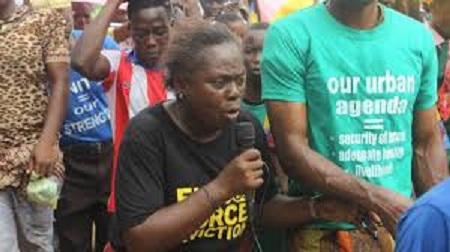GENEVA—A United Nations human rights expert has asked the Government of Nigeria for an urgent explanation of the forced eviction of 30,000 people in Lagos State in the last week.
Four people are reported to have died in the latest operation to clear irregular developments along the State’s waterfronts. Residents in the Otodo Gbame community say they suffered brutal treatment and are now homeless. Most of the people affected lived in poor fishing communities and say they have lost their livelihoods and food sources as well as their homes and possessions.
“It has been brought to my attention that the evictions may have involved the extreme use of force and fire by the Nigerian police force and Lagos State Government, leaving individuals and families scrambling in the middle of the night to find safety and shelter,” said the United Nations Special Rapporteur on the right to housing, Leilani Farha.
“The mass displacement and reports of four deaths are deeply disturbing,” she stressed.
In an urgent communication, Ms. Farha has asked the Nigerian Government for information on the evictions, the methods used and their compliance with international human rights law.
She is also questioning whether the community was given adequate notice or alternative accommodation, as required by international law. The operation took place only days after the Lagos State High Court had issued an injunction restraining demolitions in the waterfront communities.
“What makes these evictions particularly concerning is that they were carried out in blatant disregard of a court order and have completely ignored international human rights guidelines on forced evictions,” the United Nations Special Rapporteur said.
“International law is clear: there must be consultation with the affected community, all alternative options to eviction must be explored, and a resettlement plan must be in place should the evictions be carried out,” she noted. “Under no circumstances should force or fire be used,” the expert urged.
The people affected, from the Egun and other ethnic minority populations, with no other options, lived in poor-quality homes along creeks and other waterfronts.
“It takes many years to build a home, a community, and a sense of trust with government, but only days to destroy it. It is truly unfortunate that so many people are left with literally nothing but memories of their former lives and questions about their human rights,” the independent expert said.
Ms. Leilani Farha (Canada) is the UN Special Rapporteur on adequate housing as a component of the right to an adequate standard of living, and on the right to non-discrimination in this context. She took up her mandate in June 2014. Ms. Farha is the Executive Director of the NGO Canada without Poverty, based in Ottawa, Canada. A lawyer by training, for the past 20 years Ms. Farha has worked both internationally and domestically on the implementation of the right to adequate housing for the most marginalized groups and on the situation of people living in poverty. Learn more, log on to: http://www.ohchr.org/EN/Issues/Housing/Pages/HousingIndex.aspx
The Special Rapporteurs are part of what is known as the Special Procedures of the Human Rights Council. Special Procedures, the largest body of independent experts in the UN Human Rights system, is the general name of the Council’s independent fact-finding and monitoring mechanisms that address either specific country situations or thematic issues in all parts of the world. Special Procedures’ experts work on a voluntary basis; they are not UN staff and do not receive a salary for their work. They are independent from any government or organization and serve in their individual capacity.
Original press release
UN Human Rights, Country Page – Nigeria:
For further information and media enquiries, please contact:
Juana Sotomayor
Tel: +41 22 917 9445
Email: jsotomayor@ohchr.org)
Patricia Varela
Tel: +41 22 928 9234
Email: pvarela@ohchr.org
or write to srhousing@ohchr.org
Photo on front page: Residents of Otodo Gbame, Ebute-Ikate and other waterfront communities in Lagos slums, mostly ancestral fishing informal settlements, march to protest against forced evictions and demolition of their homes on 15 November 2016 Source: Pius Utomi Ekpei/AFP. Photo on this page: Less than a month after state delegations adopted the “New Urban Agenda” at Habitat III (Quito, 1721 October 2016), residents of Otodo Gbame protest their arbitrary and violent eviction, which the states—including Nigeria—committed to prevent (paras. 31, 107 and 111). Source: Sahara Reporters.














